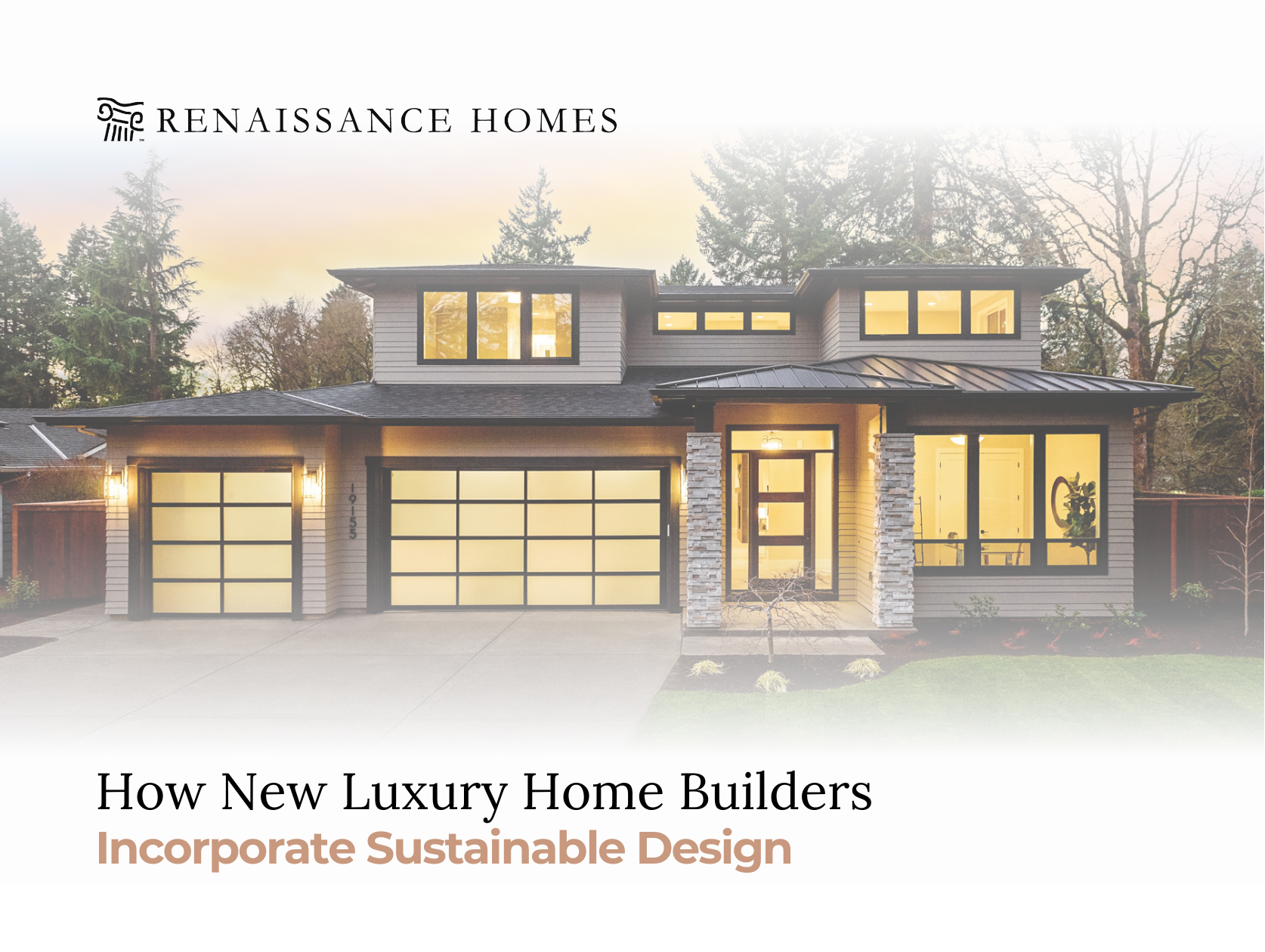The luxury home building industry is experiencing a transformative shift as environmental consciousness becomes a priority for discerning homeowners. Modern buyers increasingly seek residences that combine opulence with responsibility, creating demand for homes that don’t compromise on elegance while respecting the planet. This evolution reflects a broader understanding that true luxury encompasses not just aesthetic beauty and comfort, but also long-term value and environmental stewardship.
Today’s high-end construction landscape demonstrates that sustainability and luxury are not mutually exclusive. Forward-thinking builders are proving that eco-conscious design can enhance rather than limit architectural possibilities, creating homes that are simultaneously stunning, comfortable, and environmentally responsible.
The Evolution of Sustainable Luxury Construction
The concept of sustainable luxury has matured significantly over the past decade. What once seemed like contradictory goals now represents the future of high-end residential construction. This shift is driven by both consumer demand and genuine innovation in building science.
Luxury homeowners have become educated about the long-term benefits of sustainable design, from reduced operating costs to improved indoor air quality. These practical advantages complement the ethical satisfaction of minimizing environmental impact. As a result, sustainability has transitioned from a niche preference to an expected standard in premium construction.
Advanced building technologies now make it possible to achieve superior performance without aesthetic compromise. Modern sustainable materials often surpass traditional options in both beauty and durability, while innovative systems provide unprecedented comfort and efficiency.
Energy-Efficient Design Principles in High-End Homes
Advanced Insulation and Building Envelope
The foundation of any energy-efficient home begins with a well-designed building envelope. Premium builders now utilize cutting-edge insulation materials that provide exceptional thermal performance while occupying minimal space. Spray foam insulation, structural insulated panels, and advanced framing techniques create airtight barriers that dramatically reduce heating and cooling demands.
High-performance windows represent another critical component. Triple-pane glazing with low-emissivity coatings and insulated frames prevent thermal transfer while maintaining crystal-clear views. These windows often feature dynamic tinting technology that automatically adjusts to optimize natural light while minimizing heat gain.
Proper air sealing eliminates the drafts and temperature inconsistencies that plague conventionally built homes. This meticulous attention to the building envelope creates spaces that maintain consistent comfort with minimal energy input, a hallmark of truly sophisticated construction.
Smart Home Integration for Efficiency
Modern luxury homes incorporate intelligent systems that optimize energy usage without requiring constant homeowner intervention. Automated climate controls learn occupancy patterns and adjust temperatures room by room, ensuring comfort where needed while conserving energy elsewhere.
Lighting systems now respond to natural daylight levels and occupancy, seamlessly adjusting to maintain perfect illumination while minimizing electricity consumption. These systems can be programmed to match lifestyle patterns, creating the right ambiance for any occasion while operating with remarkable efficiency.
Integration extends to major appliances and whole-home systems, allowing centralized monitoring and control. Homeowners can track energy consumption in real time, identify opportunities for improvement, and make informed decisions about their household operations.
Renewable Energy Solutions in Custom Luxury Homes
Solar Power Integration
Solar energy has evolved from a visible add-on to an integrated architectural element in custom luxury home plans. Building-integrated photovoltaic systems seamlessly incorporate solar cells into roofing materials, creating clean lines that maintain aesthetic integrity while generating substantial electricity.
Modern solar installations often include battery storage systems that capture excess generation for use during peak demand periods or grid outages. This self-sufficiency appeals to luxury homeowners who value independence and resilience alongside environmental benefits.
Strategic system sizing ensures optimal performance without oversizing. Professional builders analyze household energy patterns, accounting for electric vehicle charging, pool equipment, and other high-demand features to design systems that meet actual needs efficiently.
Geothermal Heating and Cooling
Geothermal systems harness the earth’s constant underground temperature to provide exceptionally efficient heating and cooling. These systems circulate fluid through underground loops, exchanging heat with the stable ground temperature rather than variable outdoor air.
The result is superior comfort with dramatically reduced energy consumption compared to conventional HVAC systems. Geothermal systems operate quietly and require minimal maintenance, qualities that align perfectly with luxury home expectations.
While installation requires higher upfront investment, the long-term operational savings and environmental benefits make geothermal systems increasingly popular in high-end construction. Many luxury homeowners view this technology as an investment in both property value and planetary health.
Sustainable Materials in Luxury Home Construction
Responsibly Sourced Natural Materials
Premium builders increasingly prioritize materials with verified sustainable origins. Reclaimed wood adds character and history while preventing new timber harvesting. These materials often exhibit superior quality compared to new lumber, having already proven their durability over decades or centuries.
Stone and tile from local quarries reduce transportation impacts while supporting regional economies. Natural materials processed with minimal chemical treatment maintain indoor air quality, an often-overlooked aspect of sustainable design that directly impacts occupant health.
Certification programs like Forest Stewardship Council (FSC) provide transparency about material origins, allowing builders and homeowners to make informed choices. This attention to provenance reflects a broader commitment to responsible construction that extends beyond the building site.
Low-VOC and Non-Toxic Finishes
Indoor air quality profoundly affects health and comfort, making finish selection critically important. Low and zero-VOC paints, stains, and sealers eliminate the off-gassing that plagues conventionally finished homes, creating immediately livable spaces without the typical new construction smell.
Natural oils and waxes finish wood surfaces beautifully while avoiding synthetic chemicals. These products often enhance the material’s natural characteristics, creating depth and richness that synthetic finishes cannot replicate.
Adhesives, caulks, and other installation materials receive similar scrutiny. By specifying low-toxicity products throughout the construction process, builders create homes that support rather than compromise occupant wellbeing from day one.
Water Conservation Features in Modern Luxury Homes
Efficient Plumbing Fixtures and Systems
High-end plumbing fixtures now combine aesthetic sophistication with water efficiency. Low-flow faucets and showerheads utilize aerating technology that maintains pressure sensation while dramatically reducing actual water consumption. Many luxury homeowners report no perceptible difference from conventional fixtures despite saving thousands of gallons annually.
Dual-flush toilets offer appropriate water volumes for different needs, while some premium models incorporate bidet functionality that enhances hygiene while reducing paper product consumption. These fixtures often feature elegant contemporary designs that complement any bathroom aesthetic.
Tankless water heaters provide endless hot water while eliminating standby energy losses. Point-of-use systems can supplement central units in distant locations, ensuring instant hot water without waste while maintaining system efficiency.
Rainwater Collection and Greywater Systems
Sophisticated water management extends beyond fixture efficiency. Rainwater harvesting systems capture precipitation for landscape irrigation, reducing demand on municipal supplies or wells. These systems can be designed discreetly, with underground storage that maintains property aesthetics.
Greywater systems repurpose water from showers, washing machines, and sinks for landscape irrigation. Properly designed systems filter and treat this water to appropriate standards while significantly reducing overall household water consumption.
Native and drought-tolerant landscaping complements these systems, creating beautiful outdoor spaces that thrive with minimal supplemental irrigation. This holistic approach to water management reflects the comprehensive thinking that characterizes premium sustainable construction.
Passive Design Strategies in High-End Construction
Strategic Orientation and Window Placement
Thoughtful site orientation maximizes natural heating, cooling, and lighting. South-facing windows capture winter sun for passive heating, while properly sized overhangs block high summer sun to prevent overheating. This timeless design principle reduces mechanical system demands while creating comfortable, naturally lit spaces.
Cross-ventilation strategies position openings to capture prevailing breezes, enabling natural cooling during moderate weather. Operable skylights and clerestory windows facilitate stack ventilation, drawing cool air through living spaces and exhausting warm air at high points.
These passive strategies work in concert with active systems, reducing their operational demands while creating more pleasant living environments. The connection between indoor and outdoor spaces enhances both comfort and livability.
Natural Lighting Optimization
Abundant natural light creates inviting spaces while reducing electrical lighting demands. Strategic window sizing and placement, combined with light-colored interior finishes, maximizes daylight penetration throughout the home.
Skylights and light tubes bring natural illumination to interior spaces that would otherwise require constant artificial lighting. Modern skylight designs prevent heat gain and loss while providing beautiful overhead light that changes throughout the day.
Lighting controls that respond to natural light levels ensure artificial lighting supplements rather than competes with daylight. This integration creates optimal illumination while minimizing energy consumption.
Sustainable Landscape Design for Luxury Properties
Native Plant Selection
Landscape design significantly impacts a property’s environmental footprint. Native plants evolved to thrive in local conditions, requiring minimal irrigation, fertilization, and pest control once established. These species also support local wildlife, creating ecosystems that enhance rather than displace natural communities.
Native landscapes often exhibit four-season interest, with flowering periods, fall colors, and winter structures that create dynamic beauty throughout the year. This natural aesthetic complements contemporary architectural styles while requiring far less maintenance than traditional landscaping.
Thoughtful plant selection creates privacy, frames views, and defines outdoor spaces while working with rather than against the local environment. This approach results in landscapes that mature beautifully while requiring minimal ongoing intervention.
Permeable Hardscaping
Traditional concrete and asphalt surfaces create runoff that stresses drainage systems and carries pollutants to waterways. Permeable paving alternatives allow water to infiltrate naturally, recharging groundwater while preventing erosion and pollution.
Permeable pavers, porous concrete, and decomposed granite create elegant driveways, patios, and walkways that function beautifully while managing stormwater responsibly. These materials often provide superior aesthetics compared to conventional hardscaping while supporting environmental goals.
Rain gardens and bioswales integrate water management into landscape design, creating beautiful features that capture and filter runoff. These elements add visual interest while demonstrating that environmental responsibility can enhance rather than constrain design possibilities.
Long-Term Durability and Maintenance Considerations
Quality Materials That Stand the Test of Time
Sustainable luxury construction prioritizes longevity over short-term cost savings. Durable materials like fiber cement siding, metal roofing, and engineered wood products provide decades of reliable performance with minimal maintenance.
Quality construction techniques ensure proper installation that maximizes material lifespan. Attention to flashing, drainage, and weather protection prevents moisture intrusion, the primary cause of premature building failure.
This focus on durability reduces lifecycle environmental impact by eliminating the need for premature replacement. Materials that last generations represent the ultimate in sustainable design, combining environmental responsibility with economic sensibility.
Maintenance-Friendly Design
Thoughtful design anticipates maintenance needs and facilitates easy access for service. Removable panels provide equipment access, while modular systems allow component replacement without extensive demolition.
Material selections consider cleaning and upkeep requirements. Surfaces that resist staining and weathering maintain their appearance with minimal intervention, reducing both labor and chemical cleaning product consumption.
Comprehensive homeowner documentation ensures proper system operation and maintenance. Understanding how sustainable features function empowers homeowners to maximize their benefits over the property’s lifetime.
The Financial Benefits of Sustainable Luxury Construction
Reduced Operating Costs
While sustainable features may increase initial construction costs, the operational savings typically provide rapid payback. Reduced energy and water consumption directly decrease monthly utility expenses, with many homeowners reporting 50% or greater reductions compared to conventionally built homes.
Durable materials and quality construction minimize maintenance and replacement costs over time. This long-term perspective recognizes that initial investment in quality yields ongoing dividends throughout the building’s lifespan.
Many jurisdictions offer incentives for sustainable construction, from tax credits to expedited permitting. These programs recognize the public benefits of efficient buildings and can significantly offset implementation costs.
Enhanced Property Value
Sustainable features increasingly drive property values as buyers recognize their benefits. Homes with verified green certifications often command premium prices and sell more quickly than comparable conventional properties.
Energy efficiency ratings and utility cost projections provide tangible value propositions for prospective buyers. Documentation of sustainable features creates marketable differentiation in competitive real estate markets.
As environmental consciousness continues growing, properties with proven sustainable performance will likely maintain value better than conventional alternatives. This future-proofing represents prudent long-term investment strategy.
Certification Programs and Standards
LEED for Homes
Leadership in Energy and Environmental Design (LEED) provides third-party verification of sustainable building practices. This internationally recognized certification evaluates homes across multiple categories, from energy efficiency to material selection and indoor environmental quality.
LEED certification demonstrates commitment to comprehensive sustainability rather than cherry-picked features. The structured framework ensures balanced attention to all aspects of environmental performance.
Different certification levels (Certified, Silver, Gold, Platinum) allow builders and homeowners to pursue achievement appropriate to their goals and budgets. This flexibility makes the program accessible while maintaining rigorous standards.
Net Zero Energy Goals
Net zero homes produce as much energy as they consume annually, achieving energy independence through efficiency and renewable generation. This aspirational goal represents the ultimate in sustainable performance.
Achieving net zero requires integrated design that optimizes efficiency before addressing generation. Proper building envelope design, efficient systems, and smart controls minimize energy demands to levels that renewable systems can reasonably meet.
While not appropriate for every project, net zero goals push design teams to maximize performance. Even homes that fall short of full net zero status benefit from the rigorous design process required to approach this standard.
Why Hire Renaissance Homes for Your Sustainable Luxury Custom Home
Locally owned and operated for over four decades, Renaissance Homes is the custom luxury home builder trusted by the area’s most discerning buyers who value both opulence and environmental responsibility. We are proud to offer the highest quality, most seamless home building experience, as the most awarded builder in Street of Dreams history.
As experts in sustainable construction, Renaissance Homes transforms dreams into reality while honoring our commitment to the environment. With premium eco-friendly products hand-selected by our award-winning design team, every custom built home design reflects our commitment to both excellence and sustainability. Our custom homes building process ensures attention to every detail, integrating cutting-edge sustainable technologies seamlessly into luxury living spaces.
When you choose our custom home builder services, you’re investing in a work of art, a celebration of craftsmanship, and a commitment to responsible stewardship. Our team’s expertise in sustainable luxury construction ensures your home will provide exceptional comfort, lasting value, and minimal environmental impact for generations to come.
Frequently Asked Questions
Do sustainable features compromise luxury aesthetics?
Modern sustainable design enhances rather than limits aesthetic possibilities. Today’s eco-friendly materials and systems often surpass traditional alternatives in both beauty and performance. From sleek solar integration to stunning reclaimed wood, sustainable choices provide unique character while supporting environmental goals.
How much does sustainable construction add to building costs?
Initial costs typically increase 5-15% depending on feature selection and certification goals. However, operational savings often provide payback within 5-10 years, with benefits continuing throughout the building’s lifetime. Many sustainable features like proper orientation and efficient design add minimal cost while providing substantial long-term value.
Can existing luxury homes be retrofitted with sustainable features?
Many sustainable technologies can be added to existing homes, though integration is typically more cost-effective during initial construction. Solar systems, efficient HVAC equipment, smart home controls, and updated insulation can significantly improve existing home performance. A professional assessment identifies the most impactful retrofit opportunities for your specific property.
How do I verify a builder’s sustainable construction expertise?
Look for builders with relevant certifications (LEED AP, Certified Green Professional), completed sustainable projects, and third-party verified performance data. Request references from previous clients who prioritized sustainability, and ask detailed questions about specific technologies and approaches. Reputable builders welcome these inquiries and provide transparent information about their sustainable construction experience.
What maintenance do sustainable home features require?
Most sustainable features require less maintenance than conventional alternatives. Solar panels need occasional cleaning, HVAC filters require regular changing, and mechanical systems benefit from annual professional servicing. Quality construction and durable materials minimize ongoing maintenance demands, with many sustainable features operating reliably for decades with minimal intervention



